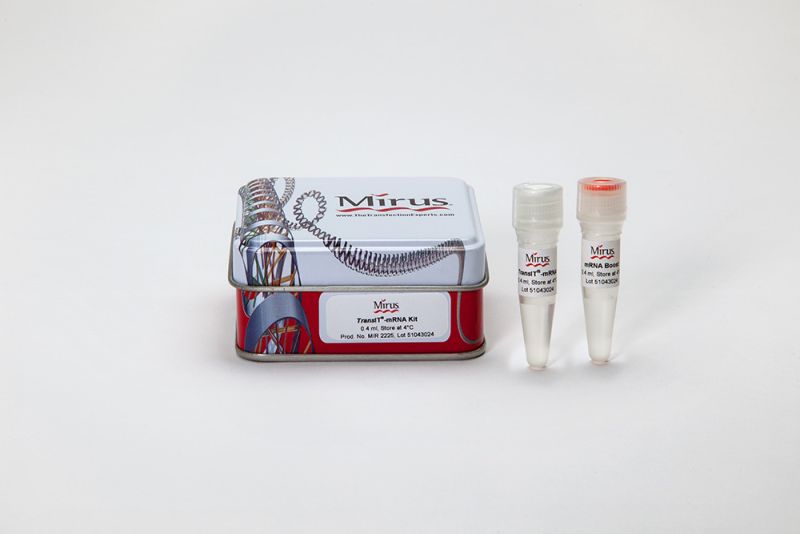TransIT-mRNA Transfection Kit
TransIT-mRNA Transfection Kit
A high efficiency, low toxicity transfection reagent for large RNA and CRISPR guide RNA
A high efficiency, low toxicity transfection reagent for large RNA and CRISPR guide RNA
Each Kit is supplied with the TransIT®-mRNA Transfection Reagent and the mRNA Boost Reagent
- Low Cellular Toxicity – Maintain cell density and reduce experimental biases
- High Efficiency Delivery – Achieve RNA delivery in a large population of cells to ensure experimental success
- Serum Compatible – Perform transfections in the presence of serum which eliminates the need for a media change and maintains cellular health
- Deliver Various Sizes of RNA – Ideal for specialized applications, such as virus production, protein expression and CRISPR genome editing
Additional Resources
- NEW! Transfection of Pseudouridine and 5-Methylcytidine Modified Messenger RNA for iPS Cell Reprogramming (PDF)
- In Vitro Transcription and Capping of Gaussia Luciferase mRNA Followed by HeLa Cell Transfection. Jani, B., Fuchs, R. J. Vis. Exp. (61), e3702.
- TransIT®-mRNA for stem cell applications
- TransIT®-mRNA for CRISPR/Cas9 genome editing
- TransIT®-mRNA for high-titer virus production
- TransIT®-mRNA comparison data to electroporation and TransMessenger® Reagent
- Cell lines successfully transfected at Mirus using TransIT®-mRNA Transfection Kit (PDF)
Technical Product Literature
Full Protocols
TransIT®-mRNA Full Transfection Protocol (PDF)
Additional Protocols
CRISPR mRNA Delivery Protocol (PDF)
Quick Reference Protocols
TransIT®-mRNA Quick Ref Protocol (PDF)
SDS
Figures and Data

Efficient Genome Editing with Cas9 mRNA + Guide RNA Oligonucleotides. HEK293T/17, U2OS and NHDF cells were co-transfected with 0.5 µg of Cas9 encoding mRNA, 5meC, ψ (Trilink Biotechnologies) and 25nM of PPIB targeting 2-part gRNA (Dharmacon) using TransIT®-mRNA Transfection Kit (0.5 µl/well of 24-well plate of both mRNA Reagent and Boost, Mirus Bio). A T7E1 mismatch detection assay was used to measure cleavage efficiency at 48 hours post-transfection.

High Efficiency and Low Toxicity Transfection Following 14 Consecutive Transfections with TransIT®-mRNA Transfection Kit. Repeated daily transfections were performed in the same population of BJ fibroblasts using TransIT®-mRNA Transfection Kit, Lipofectamine® RNAiMAX (Life Technologies) and Stemfect™ RNA Transfection Kit (Stemgent) - with a capped and polyadenylated EGFP mRNA incorporating pseudouridine and 5mC modified bases (Trilink Biotechnologies, Inc.). Multiple reagent-to-RNA ratios were tested and the optimal ratio is represented. Transfections were performed in 12-well plates using the indicated reagent-to-RNA ratios to deliver 1 µg of RNA. GFP and phase contrast images were taken in the same field of view everyday after transfection. Transfection efficiency was measured by flow cytometry on a Guava® easyCyte™ 5HT following 14 consecutive daily transfections (blue bars). Cell viability was determined using cell counts measured during flow cytometry (black line grey bars). Error bars represent the standard deviation of triplicate wells.

TransIT®-mRNA Transfection Kit Transfects GFP mRNA into DC 2.4 Dendritic Cells. Using TransIT®-mRNA Transfection Kit, DC 2.4 cells were transfected with (A) 0.5 µg, (B) 1 µg and (C) 2.5 µg of capped and polyadenylated mRNA encoding GFP with 1 µl TransIT®-mRNA Reagent and 1 µl Boost. Cells were seeded overnight at 100,000 cells/well in 24-well plates. Images were taken 10 hours post-transfection.

Multiple Dendritic Cell Types Express GFP from mRNA Transfected by TransIT®-mRNA Transfection Kit. Murine primary bone marrow derived dendritic cells (BMDC) and murine dendritic cells types (JAWSII and DC 2.4) were transfected with 1 µg of capped and polyadenlyated mRNA encoding GFP using a TransIT®-mRNA Reagent: Boost: mRNA ratio of 1:1:1 (µl:µl:µg). Primary BMDCs, JAWSII and DC 2.4 were seeded (80,000 cell/well) overnight in 24-well plates. Cells were assayed via flow cytometry 8 hours post transfection. Error bars represent the standard deviation of at least 3 separate experiments.

High Level Luciferase Expression after Delivery of a Luciferase mRNA Using TransIT®-mRNA Transfection Kit. Cells in 12-well plates were transfected with a capped and polyadenylated mRNA encoding luciferase using the TransIT®-mRNA Transfection Kit. Approximately 18 hrs post-transfection the cells were harvested and the total luciferase activity per well was determined.

TransIT®-mRNA Transfection Kit Efficiently Delivers lacZ mRNA to CHO-K1 Cells. Using the TransIT®-mRNA Transfection Kit, CHO-K1 cells were mock transfected (A) or transfected with a capped and polyadenylated lacZ encoding mRNA (B). Approximately 18 hrs post-transfection the cells were stained using Mirus Bio’s Beta-gal Staining Kit to identify the lacZ transfected cells.

Transfection Optimization in Sf9 insect cells with TransIT®-mRNA Transfection Kit. Mixed adherent and suspension Sf9 insect cells were transfected in a 12-well plate with CleanCap EGFP mRNA (TriLink BioTechnologies). TransIT®-mRNA complexes were prepared in Grace’s Insect Medium (Thermo Fisher Scientific) with different ratios of TransIT®-mRNA Transfection Reagent, mRNA Boost Reagent, and EGFP mRNA (v:v:w). All transfection complexes were incubated for 5 min at room temperature. The best ratio identified was 4 µl TransIT®-mRNA : 4 µl mRNA Boost : 2 µg EGFP mRNA (1 µg/µl); representative images were taken 18 hours post-transfection and are shown above.


